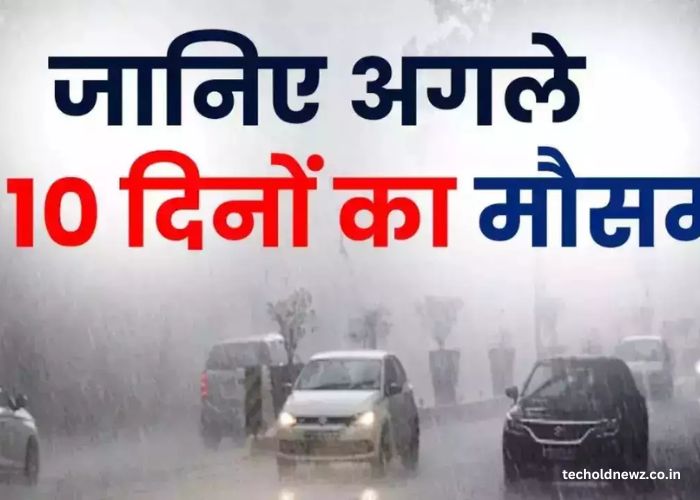Weather forecasting plays an essential role in planning our daily lives. Whether it’s deciding what to wear, planning a trip, or organizing outdoor events, knowing the weather for the next ten days—“10 din ka mausam”—helps us prepare better. With technological advancements, accessing accurate weather information has become easier and more convenient.
This blog explores the importance of 10-day weather forecasts, how they are made, and their reliability, while providing tips on using this information effectively.
Key Points:
- Weather forecasts for 10 days help in planning ahead.
- Advanced tools make long-term predictions more reliable.
- Understanding the forecast ensures better preparedness.
Why Are 10-Day Weather Forecasts Important?
Helps in Planning Everyday Activities
A 10-day weather forecast provides insights into temperature, precipitation, wind, and other weather conditions, enabling better planning. For example, if you know that rain is expected on the weekend, you can reschedule an outdoor event or prepare rain gear in advance. This proactive approach saves time and reduces inconvenience.
Reminder: Always double-check forecasts for the most updated information before making significant plans.
Ensures Safety During Extreme Weather
Long-term forecasts can alert us to severe weather events, such as storms, heavy rains, or heatwaves. Knowing about such conditions in advance allows individuals and authorities to take preventive measures. For example, farmers can safeguard crops against unseasonal rainfall, and commuters can avoid risky travel during storms.
| Benefit | Example |
|---|---|
| Event Planning | Rescheduling outdoor gatherings |
| Safety Measures | Preparing for storms or heavy rainfall |
| Agriculture Preparation | Protecting crops during weather extremes |
Supports Agriculture and Outdoor Businesses
Farmers and businesses reliant on weather, such as construction or tourism, benefit significantly from a 10-day forecast. Predicting rainfall or dry spells ensures optimal scheduling for planting, harvesting, or outdoor activities.
How Are 10-Day Weather Forecasts Created?
Advanced Meteorological Models
Modern weather forecasts rely on complex meteorological models. These use data collected from satellites, radar systems, and ground stations to simulate atmospheric conditions. For instance, numerical weather prediction models like the GFS (Global Forecast System) and ECMWF (European Centre for Medium-Range Weather Forecasts) help meteorologists provide accurate 10-day predictions.
Use of AI and Machine Learning
In recent years, AI and machine learning have enhanced weather forecasting. These technologies analyze historical data to identify patterns, improving the accuracy of predictions. For example, they can predict the likelihood of rain in specific regions with impressive precision.
Note: Despite advancements, long-term forecasts can occasionally vary due to the dynamic nature of the atmosphere.
| Technology Used | Purpose |
|---|---|
| Satellites | Collect atmospheric data |
| AI and Machine Learning | Analyze and refine predictions |
| Meteorological Models | Simulate weather patterns |
Limitations of Long-Term Forecasting
While 10-day forecasts are highly beneficial, they are not foolproof. The accuracy decreases as the prediction range extends due to the chaotic nature of weather systems. However, regular updates and revisions improve reliability.
How to Make the Most of 10-Day Weather Forecasts?
Checking Weather Apps and Websites
Apps and websites like AccuWeather, Weather.com, and the IMD (India Meteorological Department) provide user-friendly platforms for accessing forecasts. You can customize settings to receive daily notifications about the weather in your region.
Understanding Forecast Symbols and Terms
Weather forecasts often use symbols like clouds, rain droplets, or suns to convey conditions quickly. Familiarizing yourself with these symbols and terms ensures you interpret the forecast accurately.
For example:
- A sun icon usually indicates clear skies.
- A cloud with raindrops shows a chance of rain.
- A thunderbolt represents a storm warning.
Planning for Special Events
Long-term forecasts are especially useful for planning weddings, picnics, or travel. Monitoring updates a few days before the event ensures you can adjust plans accordingly.
| Tip | Action |
|---|---|
| Use Reliable Apps | Download apps with accurate forecasts |
| Learn Weather Symbols | Understand icons and terms |
| Monitor Updates | Check frequently for changes |
What Are the Benefits of Knowing 10-Day Weather Forecasts?
Saves Time and Resources
By knowing the weather in advance, individuals can optimize their schedules and resources. For example, scheduling laundry on sunny days or avoiding unnecessary travel during rain saves effort and reduces wastage.
Enhances Outdoor Experiences
A clear understanding of the forecast ensures outdoor plans are enjoyable. For instance, picnics on sunny days or hiking during pleasant weather become more memorable and stress-free.
Increases Awareness About Climate Trends
Long-term forecasts also provide insights into seasonal climate trends, helping people adapt to changing conditions. For example, predictions about an extended heatwave can prompt the use of cooling measures at home or workplaces.
Reminder: Always carry an umbrella or raincoat when there’s a high chance of rain in the forecast.
| Advantage | Impact |
|---|---|
| Saves Resources | Efficient planning |
| Improves Outdoor Plans | Better preparation for events |
| Provides Climate Insights | Awareness of seasonal trends |
Conclusion
The “10 din ka mausam” forecast has become an essential tool for modern living. By providing accurate predictions about upcoming weather conditions, it empowers individuals, businesses, and governments to plan effectively. Whether it’s for personal safety, agricultural operations, or simply enjoying outdoor activities, a 10-day weather forecast ensures better preparedness and convenience.
As weather forecasting technology continues to advance, its importance in our daily lives will only grow. Make it a habit to check reliable sources for your “10 din ka mausam” updates and experience the benefits of being well-prepared.
FAQs:
- Where can I find reliable 10-day weather forecasts?
Apps like AccuWeather and websites like Weather.com offer accurate 10-day predictions. - How accurate are 10-day weather forecasts?
They are generally reliable but may vary slightly, especially for long-term predictions. - Can I get a 10-day forecast for my specific region?
Yes, most weather platforms allow location-specific forecasts. - Why is it important to check 10-day weather updates?
It helps with planning, safety, and resource optimization. - What tools are used to predict 10-day weather forecasts?
Advanced meteorological models, satellites, and AI technologies are commonly used.


